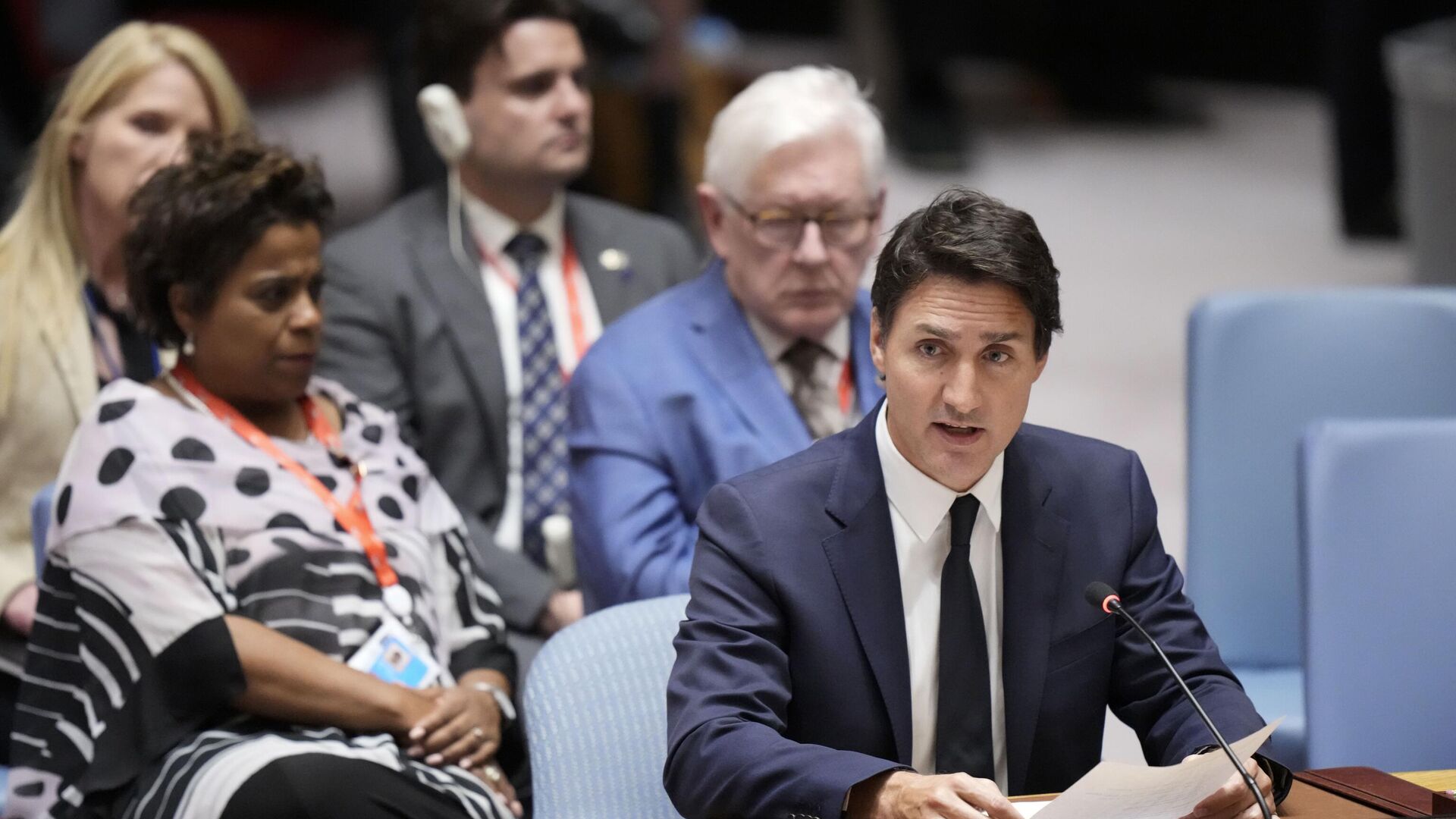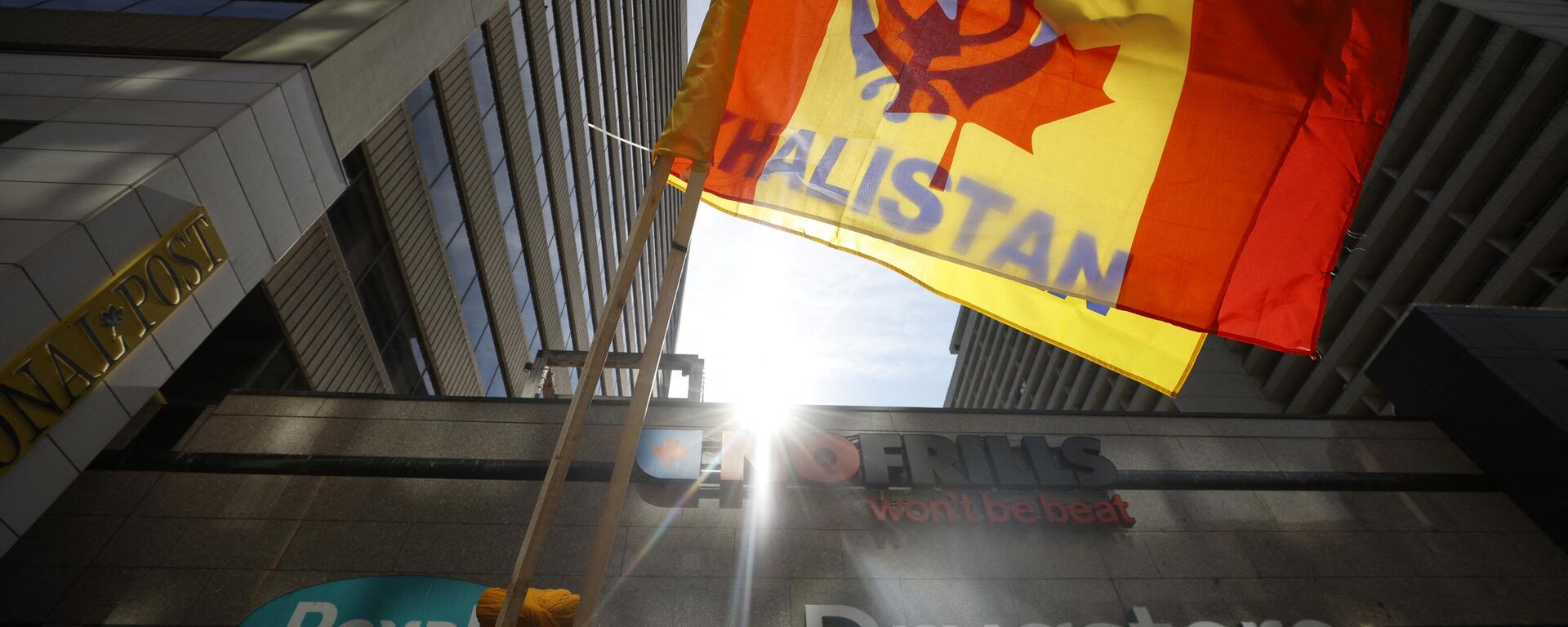https://sputniknews.in/20241018/sick-of-trudeau-growing-discontent-across-canada-8285134.html
'Sick of Trudeau': Discontent With Canadian PM Mounting
'Sick of Trudeau': Discontent With Canadian PM Mounting
Sputnik India
Pro-Khalistani politicians have “infiltrated” Canadian politics, overshadowing the Sikh majority, experts told Sputnik India. This has led India to downgrade... 18.10.2024, Sputnik India
2024-10-18T18:14+0530
2024-10-18T18:14+0530
2024-10-18T19:03+0530
government of india
canada
ministry of external affairs (mea)
khalistan movement
narendra modi
justin trudeau
pakistan
raw
us
sikhs
https://cdn1.img.sputniknews.in/img/07e8/0a/12/8287457_0:63:3072:1791_1920x0_80_0_0_52ccdc19543a41e8c92a70cdce3b0b5d.jpg
India has criticised Canadian Prime Minister Justin Trudeau for having a “cavalier attitude” after he acknowledged possessing only “intelligence-based speculation” and no “hard evidentiary proof” regarding the alleged involvement of Indian agents in the assassination of Khalistani activist Hardeep Singh Nijjar. The allegations against India and its diplomats have led to a series of tit-for-tat expulsions, marking a significant low in bilateral relations.The Ministry of External Affairs (MEA) spokesperson Randhir Jaiswal highlighted the gap between Trudeau’s words and his actions during a recent press briefing. While Trudeau has voiced support for a One-India policy, thus negating the breakaway Khalistan movement’s objectives, no actions against the movement’s leaders have been taken.At least 26 extradition requests from India that were submitted over the past decade or more remain unresolved by Canadian authorities, Jaiswal noted.Trudeau has caused considerable damage to bilateral relations, Major Gaurav Arya (Retd), editor-in-chief of Chanakya Forum, told Sputnik India.One year ago, the Canadian PM claimed that he would reveal evidence of wrongdoing regarding the assassination, yet despite India’s repeated requests to see this proof, he now admits that he has no solid evidence but only fragments of intelligence, which is often unreliable and cannot hold up in court.Over 20 Labor Party MPs have signed a statement calling him to step down, Arya noted, highlighting the current dynamics within the party.Canada, particularly under the Trudeau government, needs to re-evaluate its stance with India, he added, arguing that successive Canadian governments have provided a safe-haven for Khalistani activists.If India identifies someone as a terrorist, “Canada should take those claims seriously and respond accordingly,” he continued.However, CBC's former Middle East Bureau Chief and veteran CBC News Senior correspondent Terry Milewski argued that “it's an exaggeration to put so much of the blame on Trudeau.”He referenced Pierre Trudeau's refusal in 1982 to extradite the man who would later become the Air India bomber, a decision that set a troubling precedent, as Canadians largely ignored the ongoing Indian issues and warnings from Delhi about potential bomb plots in 1985.This indifference spans across all Canadian political parties, and while Trudeau can be held accountable as the current leader, it's important to recognise that the blame should be shared more broadly, given the historical context, Milewski argued.This has led to a misconception among Canadians that all Sikhs support Khalistan, a narrative reinforced by Khalistani groups who label criticism of their violence as racism, despite many Sikhs wanting nothing to do with separatism, he stated.Politicians often seek the support of influential figures at Gurdwaras, who can sway thousands of votes in exchange for endorsing anti-India sentiments and participating in events celebrating Khalistani figures, making it easy for them to gain political favour without scrutinising the implications, Milewski underlined.Recently, Khalistanis have even disrupted memorials for Air India victims by promoting a narrative that portrays the Indian government as being responsible for the 1985 bombing tragedy, despite the involvement of Khalistani terrorists, the expert highlighted.This effort includes politicians like Sukhminder "Sukh" Singh Dhaliwal, who calls for a reinvestigation of the bombing to cast doubt on the Indian government, aiming to portray it as perpetuating violence against Sikhs, Milewski warned.Canada's Support of Pro-Khalistanis is a Deeper HypocrisyMilewski mentioned that a distinct indifference towards certain countries is a “Canadian Trademark”.A poll conducted around the anniversary of the Air India bombing revealed that nine out of ten Canadians were unaware of the incident, indicating a troubling level of ignorance. This lack of awareness is deeply distressing for the victims' families, who feel marginalized and overlooked by their fellow Canadians, he added.On the other hand, the military expert pointed out that Canada’s selective condemnation of extremism — such as that of Nazi sympathisers and anti-Hindu radicals — while simultaneously protecting Khalistani groups, reveals a deeper hypocrisy in its political system, especially in how it treats different ethnic communities.When a Canadian diplomat attempted to raise these concerns, he was silenced, highlighting the inconsistency in Canada’s self-proclaimed status as a human rights advocate, he added.The expert emphasised “this entire thing about Canada being a haven for human rights, this is a sham — this is not something that is true because then their activities all over the world should have been the same.”Both India and Canada have made significant miscalculations, with Canada being swayed by Khalistani propagandists, while India, justified in its anger towards Canada's support for the Khalistan movement, may need to negotiate a deal if it has overreacted and engaged in illegal actions on Canadian soil, the journalist contended.Given the lack of evidence, the Indian government could consider temporarily closing its embassies and reduce staff to a minimum, similar to its approach with Pakistan.Arya emphasised the importance of a continuous campaign discouraging people, particularly students, from going to Canada, claiming it is unsafe for them.Indian parents not to send their children there, highlighting the risks posed by threats, including those made by Gurpatwant Singh Pannu, who has urged Hindus to leave Canada, he concluded.
https://sputniknews.in/20241017/west-emboldening-khalistanis-as-part-of-proxy-war-against-india-opinion-8281082.html
canada
pakistan
us
Sputnik India
feedback.hindi@sputniknews.com
+74956456601
MIA „Rossiya Segodnya“
2024
Swapna Nair
https://cdn1.img.sputniknews.in/img/07e7/09/12/4320104_0:0:681:681_100x100_80_0_0_ca8a7d4d582609272840ffdd1cde7278.jpg
Swapna Nair
https://cdn1.img.sputniknews.in/img/07e7/09/12/4320104_0:0:681:681_100x100_80_0_0_ca8a7d4d582609272840ffdd1cde7278.jpg
News
en_IN
Sputnik India
feedback.hindi@sputniknews.com
+74956456601
MIA „Rossiya Segodnya“
Sputnik India
feedback.hindi@sputniknews.com
+74956456601
MIA „Rossiya Segodnya“
Swapna Nair
https://cdn1.img.sputniknews.in/img/07e7/09/12/4320104_0:0:681:681_100x100_80_0_0_ca8a7d4d582609272840ffdd1cde7278.jpg
government of india, canada, ministry of external affairs (mea), khalistan movement, narendra modi, justin trudeau, pakistan, raw, us, sikhs, hindu, s. jaishankar
government of india, canada, ministry of external affairs (mea), khalistan movement, narendra modi, justin trudeau, pakistan, raw, us, sikhs, hindu, s. jaishankar
'Sick of Trudeau': Discontent With Canadian PM Mounting
18:14 18.10.2024 (Updated: 19:03 18.10.2024) Pro-Khalistani politicians have “infiltrated” Canadian politics, overshadowing the Sikh majority, experts told Sputnik India. This has led India to downgrade its relationship with Canada, potentially halting trade and discouraging visa applications, they say.
India has criticised Canadian Prime Minister Justin Trudeau for having a “cavalier attitude” after he acknowledged possessing only “intelligence-based speculation” and no “hard evidentiary proof” regarding the alleged involvement of Indian agents in the assassination of Khalistani activist Hardeep Singh Nijjar. The allegations against India and its diplomats have led to a series of tit-for-tat expulsions, marking a significant low in bilateral relations.
The Ministry of External Affairs (MEA) spokesperson Randhir Jaiswal highlighted the gap between Trudeau’s words and his actions during a recent press briefing. While Trudeau has voiced support for a One-India policy, thus negating the breakaway Khalistan movement’s objectives, no actions against the movement’s leaders have been taken.
At least 26 extradition requests from India that were submitted over the past decade or more remain unresolved by Canadian authorities, Jaiswal noted.
Trudeau has caused considerable damage to bilateral relations, Major Gaurav Arya (Retd), editor-in-chief of Chanakya Forum, told Sputnik India.
One year ago, the Canadian PM claimed that he would reveal evidence of wrongdoing regarding the assassination, yet despite India’s repeated requests to see this proof, he now admits that he has no solid evidence but only fragments of intelligence, which is often unreliable and cannot hold up in court.
“Canadians are sick of Trudeau,” the military pundit remarked, pointing to Trudeau's loss of key seats and credibility, as many now call for his resignation.
Over 20 Labor Party MPs have signed a statement calling him to step down, Arya noted, highlighting the current dynamics within the party.
Canada, particularly
under the Trudeau government, needs to re-evaluate its stance with India, he added, arguing that successive Canadian governments have provided a safe-haven for Khalistani activists.
“First of all, why would you have these terrorists? And they are not Khalistani terrorists. They are Canadian terrorists, because Hardeep Singh Nijjar carried a Canadian passport,” Arya asserted. “So to call him a Khalistani terrorist is like giving a pass to the Canadian government while stating that, you are not guilty of harbouring terrorists which is untrue as the Canadian government is guilty.”
If India identifies someone as a terrorist, “Canada should take those claims seriously and respond accordingly,” he continued.
However, CBC's former Middle East Bureau Chief and veteran CBC News Senior correspondent Terry Milewski argued that “it's an exaggeration to put so much of the blame on Trudeau.”
While Trudeau can be held partly responsible, the primary blame lies with the long-standing complicity and shameful indulgence of Canadian political parties and leaders, dating back to his father Pierre Trudeau's time, with respect to the Khalistan movement, Milewski told Sputnik India.
He referenced Pierre Trudeau's refusal in 1982 to extradite the man who would later become the Air India bomber, a decision that set a troubling precedent, as
Canadians largely ignored the ongoing Indian issues and warnings from Delhi about potential bomb plots in 1985.
This indifference spans across all Canadian political parties, and while Trudeau can be held accountable as the current leader, it's important to recognise that the blame should be shared more broadly, given the historical context, Milewski argued.
Pro-Khalistani politicians have indeed infiltrated Canadian politics and have been notably effective, being more organized and vocal than the Sikh majority that opposes the Khalistan movement, Milewski stressed.
This has led to a misconception among Canadians that all Sikhs support Khalistan, a narrative reinforced by Khalistani groups who label criticism of their violence as racism, despite many Sikhs wanting nothing to do with separatism, he stated.
Politicians often seek the support of influential figures at Gurdwaras, who can sway thousands of votes in exchange for endorsing anti-India sentiments and participating in events celebrating Khalistani figures, making it easy for them to gain political favour without scrutinising the implications, Milewski underlined.
Khalistani activists in Canada benefit from a supportive community and rely on volunteer efforts from groups like the World Sikh Organization and Sikhs for Justice, allowing them to maintain a low-budget yet effective campaign, he emphasised.
Recently, Khalistanis have even disrupted memorials for Air India victims by promoting a narrative that portrays the Indian government as being responsible for the 1985 bombing tragedy, despite the
involvement of Khalistani terrorists, the expert highlighted.
This effort includes politicians like Sukhminder "Sukh" Singh Dhaliwal, who calls for a reinvestigation of the bombing to cast doubt on the Indian government, aiming to portray it as perpetuating violence against Sikhs, Milewski warned.
Canada's Support of Pro-Khalistanis is a Deeper Hypocrisy
Milewski mentioned that a distinct indifference towards certain countries is a “Canadian Trademark”.
A poll conducted around the anniversary of the Air India bombing revealed that nine out of ten Canadians were unaware of the incident, indicating a troubling level of ignorance. This lack of awareness is deeply distressing for the victims' families, who feel marginalized and overlooked by their fellow Canadians, he added.
On the other hand, the military expert pointed out that Canada’s selective condemnation of extremism — such as that of Nazi sympathisers and anti-Hindu radicals — while simultaneously protecting Khalistani groups, reveals a deeper hypocrisy in its political system, especially in how it treats different ethnic communities.
Canada is currently governed by an administration that believes it is championing human rights, despite its history, including the deployment of over 40,000 troops to Afghanistan for a decade during which the Canadian Armed Forces were criticised by Human Rights Watch for serious violations, Arya reckoned.
When a Canadian diplomat attempted to raise these concerns, he was silenced, highlighting the inconsistency in Canada’s self-proclaimed status as a human rights advocate, he added.
The expert emphasised “this entire thing about Canada being a haven for human rights, this is a sham — this is not something that is true because then their activities all over the world should have been the same.”
India should reconsider its relationship with Canada and significantly downgrade it, including halting trade and advising citizens against seeking Canadian visas, Arya asserted.
Both India and Canada have made significant miscalculations, with Canada being
swayed by Khalistani propagandists, while India, justified in its anger towards Canada's support for the Khalistan movement, may need to negotiate a deal if it has overreacted and engaged in illegal actions on Canadian soil, the journalist contended.
Given the
lack of evidence, the Indian government could consider temporarily closing its embassies and reduce staff to a minimum, similar to its approach with Pakistan.
Arya emphasised the importance of a continuous campaign discouraging people, particularly students, from going to Canada, claiming it is unsafe for them.
Indian parents not to send their children there, highlighting the risks posed by threats, including those made by Gurpatwant Singh Pannu, who has urged Hindus to leave Canada, he concluded.



